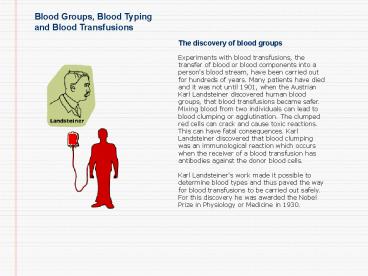What is blood made up of - PowerPoint PPT Presentation
Title:
What is blood made up of
Description:
... consists of several types of cells floating around in a fluid called plasma. ... Many people also have a so called Rh factor on the red blood cell's surface. ... – PowerPoint PPT presentation
Number of Views:143
Avg rating:3.0/5.0
Title: What is blood made up of
1
(No Transcript)
2
What is blood made up of?
- An adult human has about 46 liters of blood
circulating in the body. Among other things,
blood transports oxygen to various parts of the
body. - Blood consists of several types of cells floating
around in a fluid called plasma.The red blood
cells contain hemoglobin, a protein that binds
oxygen. Red blood cells transport oxygen to, and
remove carbon dioxide from, the body
tissues.The white blood cells fight
infection.The platelets help the blood to clot,
if you get a wound for example.The plasma
contains salts and various kinds of proteins.
3
What are the different blood groups?
- The differences in human blood are due to the
presence or absence of certain protein molecules
called antigens and antibodies. The antigens are
located on the surface of the red blood cells and
the antibodies are in the blood plasma.
Individuals have different types and combinations
of these molecules. The blood group you belong to
depends on what you have inherited from your
parents. - There are more than 20 genetically determined
blood group systems known today, but the AB0 and
Rh systems are the most important ones used for
blood transfusions. Not all blood groups are
compatible with each other. Mixing incompatible
blood groups leads to blood clumping or
agglutination, which is dangerous for individuals.
4
AB0 blood grouping system
- According to the AB0 blood typing system there
are four different kinds of blood types A, B, AB
or 0. - Blood group AIf you belong to the blood group A,
you have A antigens on the surface of your red
blood cells and B antibodies in your blood
plasma. - Blood group BIf you belong to the blood group B,
you have B antigens on the surface of your red
blood cells and A antibodies in your blood
plasma. - Blood group ABIf you belong to the blood group
AB, you have both A and B antigens on the surface
of your red blood cells and no A or B antibodies
at all in your blood plasma. - Blood group 0If you belong to the blood group 0
(null), you have neither A or B antigens on the
surface of your red blood cells but you have both
A and B antibodies in your blood plasma.
5
Rh factor blood grouping system
- Many people also have a so called Rh factor on
the red blood cell's surface. This is also an
antigen and those who have it are called Rh.
Those who haven't are called Rh-. A person with
Rh- blood does not have Rh antibodies naturally
in the blood plasma (as one can have A or B
antibodies, for instance). But a person with Rh-
blood can develop Rh antibodies in the blood
plasma if he or she receives blood from a person
with Rh blood, whose Rh antigens can trigger the
production of Rh antibodies. A person with Rh
blood can receive blood from a person with Rh-
blood without any problems.
6
Blood group notation
According to above blood grouping systems, you
can belong to either of following 8 blood groups
Do you know which blood group you belong to?
7
Blood transfusions who can receive blood from
whom?
Of course you can always give A blood to persons
with blood group A, B blood to a person with
blood group B and so on. But in some cases you
can receive blood with another type of blood
group, or donate blood to a person with another
kind of blood group.The transfusion will work
if a person who is going to receive blood has a
blood group that doesn't have any antibodies
against the donor blood's antigens. But if a
person who is going to receive blood has
antibodies matching the donor blood's antigens,
the red blood cells in the donated blood will
clump.































